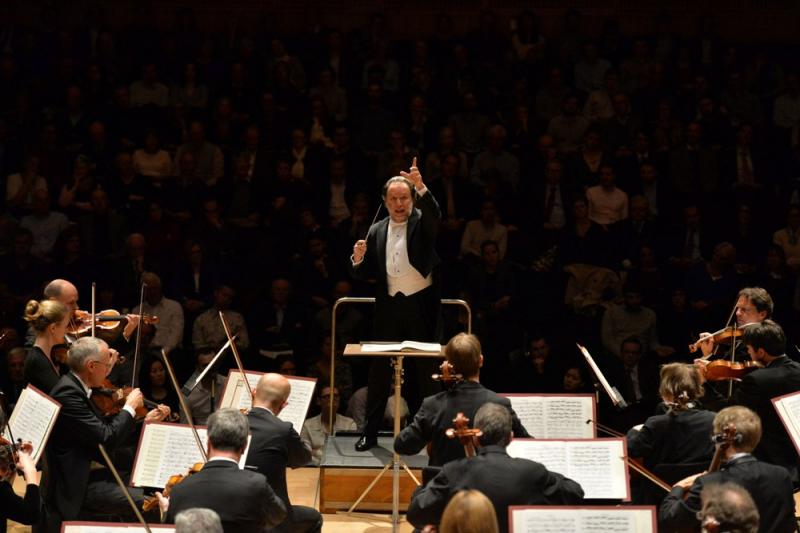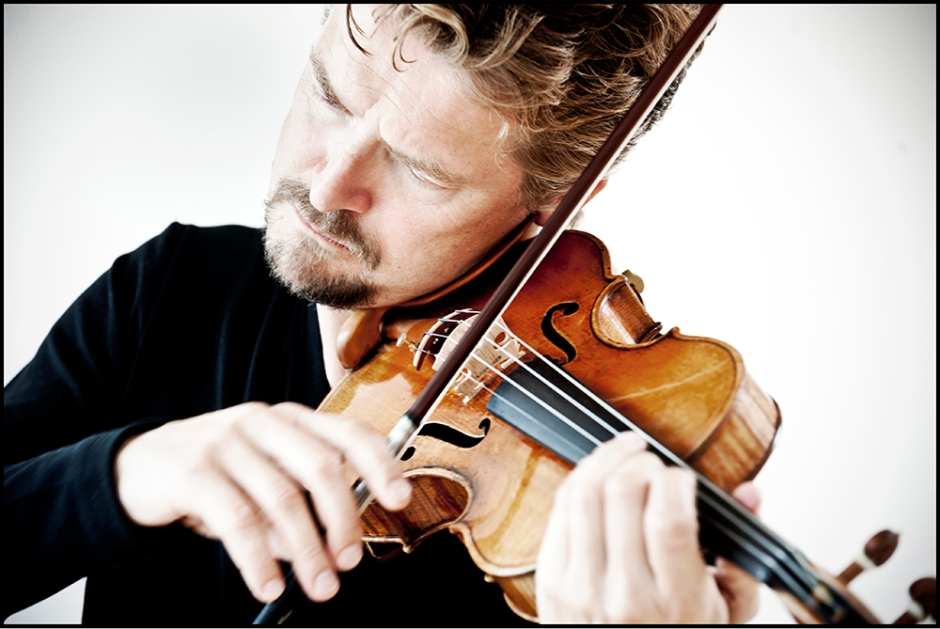Tetzlaff, Gewandhausorchester Leipzig, Chailly, Barbican | reviews, news & interviews
Tetzlaff, Gewandhausorchester Leipzig, Chailly, Barbican
Tetzlaff, Gewandhausorchester Leipzig, Chailly, Barbican
Zarathustrian joys and passions stun in the high noon of a stylish residency

In practice as well as in prospect, the second in Riccardo Chailly’s Strauss/Mozart trilogy was a concert of two very different halves.
It was even better than that. When have you ever heard the rolling energy of the “Joys and Passions” section more superbly nuanced than by the Leipzig violins in perfect synch with the horns? This one took flight as the more heavily-scored climaxes of Ein Heldenleben had not. Was there ever a more terrifying midnight bell than the one struck here – iron, I’m guessing, rather than the usual tubular discretion – to accompany truly orgiastic revels as Nietzsche’s Uebermensch (“Superman” seems a dim rendering) goes berserk?
The task is to rekindle some of the sheer astonishment that hooked young musicians like Bartók, turning decisively to composition as a result, in the late 1890s. Most composers today would kill for the kind of sounds that glint in Strauss’s spider-web, following one another in kaleidoscopic procession as he forges his own poetic tribute to Nietzsche, the genius who inspired his own artistic independence.
 Chailly knew how to achieve the right balances for everything, even if the first astonishing flight into cerulean blue skies seemed a little contained. It comes out of a doggedly scientific fugue on all 12 notes of the chromatic scale kicked off by back desks of double-basses and cellos: music for the eye as much as the ear, which strained to catch the whispered note-rows. At the other end of Strauss’s anything-goes philosophy was the lilting Viennese waltz offering leader Frank-Michael Erben a more modest triumph after his peerless impersonation of the composer-hero’s wife on Tuesday. And Chailly made sure that we always heard the three-note theme enshrined in Kubrick's 2001 powering the dance.
Chailly knew how to achieve the right balances for everything, even if the first astonishing flight into cerulean blue skies seemed a little contained. It comes out of a doggedly scientific fugue on all 12 notes of the chromatic scale kicked off by back desks of double-basses and cellos: music for the eye as much as the ear, which strained to catch the whispered note-rows. At the other end of Strauss’s anything-goes philosophy was the lilting Viennese waltz offering leader Frank-Michael Erben a more modest triumph after his peerless impersonation of the composer-hero’s wife on Tuesday. And Chailly made sure that we always heard the three-note theme enshrined in Kubrick's 2001 powering the dance.
Basses and brass were the underpinning heroes of Macbeth, with the kind of fanfares – stretching into the 1940s to characterise Jupiter in Strauss’s penultimate opera Die Liebe der Danae – we know all too well from John Williams’ Star Wars score and others of that ilk. This felt, in the closeness of the Barbican acoustic, like a film score turned up too loud in a Leicester Square cinema – a tale told by a conservative 19th-century composer full of sound and fury, signifying no matter from the heart. When Macbeth finally falls, after an extra bout of battle-thrashing which could well be cut, the shadowy gestures around Macduff’s victory did at last make some kind of original impact.
Macbeth at least made the tiny forces for Mozart’s Violin Concerto No. 3 in G all the more welcome; this is the kind of ensemble that sounds best in the venue. As in Tuesday’s 1791 concerto, there were no trumpets or timpani; but, a starring role for oboes apart, this elegant work with a host of attractive melodies asks for none of the subtle dialoguing with the soloist we’d had between the Gewandhaus strings and Maria João Pires. Even so, Christian Tetzlaff (pictured above by Giorgia Bertazzi) made the best possible case for pure song, managing a delicious swell on the top note of the slow-movement theme, and driving never too aggressively forward, dropping extra pearls of ornamentation as he went.
- Last concert and masterclasses today, 23 October, at the Barbican and Milton Court
The future of Arts Journalism
You can stop theartsdesk.com closing!
We urgently need financing to survive. Our fundraising drive has thus far raised £49,000 but we need to reach £100,000 or we will be forced to close. Please contribute here: https://gofund.me/c3f6033d
And if you can forward this information to anyone who might assist, we’d be grateful.

Subscribe to theartsdesk.com
Thank you for continuing to read our work on theartsdesk.com. For unlimited access to every article in its entirety, including our archive of more than 15,000 pieces, we're asking for £5 per month or £40 per year. We feel it's a very good deal, and hope you do too.
To take a subscription now simply click here.
And if you're looking for that extra gift for a friend or family member, why not treat them to a theartsdesk.com gift subscription?
more Classical music
 Bizet in 150th anniversary year: rich and rare French offerings from Palazzetto Bru Zane
Specialists in French romantic music unveil a treasure trove both live and on disc
Bizet in 150th anniversary year: rich and rare French offerings from Palazzetto Bru Zane
Specialists in French romantic music unveil a treasure trove both live and on disc
 Scottish Chamber Orchestra, Ibragimova, Queen’s Hall, Edinburgh review - rarities, novelties and drumrolls
A pity the SCO didn't pick a better showcase for a shining guest artist
Scottish Chamber Orchestra, Ibragimova, Queen’s Hall, Edinburgh review - rarities, novelties and drumrolls
A pity the SCO didn't pick a better showcase for a shining guest artist
 Kilsby, Parkes, Sinfonia of London, Wilson, Barbican review - string things zing and sing in expert hands
British masterpieces for strings plus other-worldly tenor and horn - and a muscular rarity
Kilsby, Parkes, Sinfonia of London, Wilson, Barbican review - string things zing and sing in expert hands
British masterpieces for strings plus other-worldly tenor and horn - and a muscular rarity
 From Historical to Hip-Hop, Classically Black Music Festival, Kings Place review - a cluster of impressive stars for the future
From quasi-Mozartian elegance to the gritty humour of a kitchen inspection
From Historical to Hip-Hop, Classically Black Music Festival, Kings Place review - a cluster of impressive stars for the future
From quasi-Mozartian elegance to the gritty humour of a kitchen inspection
 Shibe, LSO, Adès, Barbican review - gaudy and glorious new music alongside serene Sibelius
Adès’s passion makes persuasive case for the music he loves, both new and old
Shibe, LSO, Adès, Barbican review - gaudy and glorious new music alongside serene Sibelius
Adès’s passion makes persuasive case for the music he loves, both new and old
 Anja Mittermüller, Richard Fu, Wigmore Hall review - a glorious hall debut
The Austrian mezzo shines - at the age of 22
Anja Mittermüller, Richard Fu, Wigmore Hall review - a glorious hall debut
The Austrian mezzo shines - at the age of 22
 First Person: clarinettist Oliver Pashley on the new horizons of The Hermes Experiment's latest album
Compositions by members of this unusual quartet feature for the first time
First Person: clarinettist Oliver Pashley on the new horizons of The Hermes Experiment's latest album
Compositions by members of this unusual quartet feature for the first time
 Gesualdo Passione, Les Arts Florissants, Amala Dior Company, Barbican review - inspired collaboration excavates the music's humanity
At times it was like watching an anarchic religious procession
Gesualdo Passione, Les Arts Florissants, Amala Dior Company, Barbican review - inspired collaboration excavates the music's humanity
At times it was like watching an anarchic religious procession
 Classical CDs: Camels, concrete and cabaret
An influential American composer's 90th birthday box, plus British piano concertos and a father-and-son duo
Classical CDs: Camels, concrete and cabaret
An influential American composer's 90th birthday box, plus British piano concertos and a father-and-son duo
 Cockerham, Manchester Camerata, Sheen, Martin Harris Centre, Manchester review - re-enacting the dawn of modernism
Two UK premieres added to three miniatures from a seminal event of January 1914
Cockerham, Manchester Camerata, Sheen, Martin Harris Centre, Manchester review - re-enacting the dawn of modernism
Two UK premieres added to three miniatures from a seminal event of January 1914
 Kempf, Brno Philharmonic, Davies, Bridgewater Hall, Manchester review - European tradition meets American jazz
Bouncing Czechs enjoy their Gershwin and Brubeck alongside Janáček and Dvořák
Kempf, Brno Philharmonic, Davies, Bridgewater Hall, Manchester review - European tradition meets American jazz
Bouncing Czechs enjoy their Gershwin and Brubeck alongside Janáček and Dvořák
 Solomon, OAE, Butt, QEH review - daft Biblical whitewashing with great choruses
Even a top soprano and mezzo can’t make this Handel paean wholly convincing
Solomon, OAE, Butt, QEH review - daft Biblical whitewashing with great choruses
Even a top soprano and mezzo can’t make this Handel paean wholly convincing

Add comment